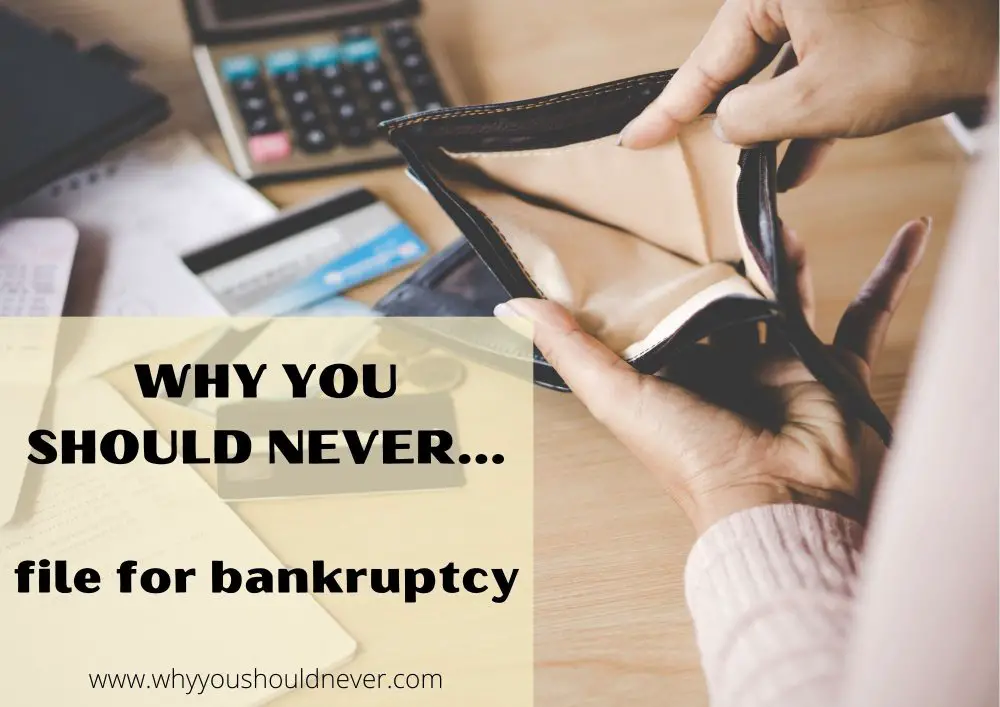![]()
Why You Should Never File For Bankruptcy
It’s easy to get scared when you’re in debt. The thought of never being able to pay off your debts seems unbearable and hopeless. Filing for bankruptcy can look like the light at the end of the tunnel.
But bankruptcy isn’t always the answer! In this article, we will show you why filing for bankruptcy might not be the best thing for your future financial stability.
What does it mean to declare yourself bankrupt?
The Bankruptcy and Insolvency Act says that bankruptcy is when a person or company who has been paying his/her bills until now can no longer pay them. Any liabilities they have are usually canceled. It can give desperate people the fresh start they need.
People generally file for bankruptcy when their finances are significantly impacted by events such as losing their job, large medical bills, divorce, and a plethora of other unexpected life circumstances.
Although you may get relief from your debt by declaring bankruptcy, it has serious negative consequences, and you should avoid it unless you have no other choice.
Here are 8 reasons why you should never declare yourself bankrupt:
1) Bankruptcy affects your credit rating
Your bankruptcy will stay on your credit report for 7 – 10 years, and it can affect the type of credit you are able to get in the future.
Therefore, you will either not be able to open a credit card account for a number of years, or have difficulty doing so.
Once your credit has been affected, even getting a mortgage will be problematic for you. Any loans you do qualify for will have steep interest rates, as you’ll now be seen as a risky borrower.
2) You might struggle to rent an apartment/house
Although you can list a bankruptcy on your rental application, landlords may still be reluctant to rent an apartment to someone who has declared themselves bankrupt.
If you are renting from a private landlord (as opposed to public housing), the only way they will feel confident renting their property is if they’re sure you’re a reliable payer. This means you will need a good credit history to be able to rent an apartment; if you have declared bankruptcy, your options may be limited.
3) Bankruptcy can affect your job prospects
Filing for bankruptcy can affect your chances of getting a job, especially if you seek employment in areas like finance, insurance, and even law, where you are asked to submit a background check before being employed.
Financial institutions will almost certainly write off any applicant who has been declared bankrupt, as this indicates that they’re unreliable when it comes to handling money.
4) You may lose your tax refund
When you file for bankruptcy, if your tax refund is based on money earned before you filed for bankruptcy, then that will be part of the bankruptcy proceedings, and thus you will lose it, no matter when the refund is paid.
5) Your credit cards will be canceled
Many credit card companies will cancel any cards you hold immediately after you file for bankruptcy.
This is a major consideration, as currently you may be using your credit cards to pay your basic living expenses.
6) Your car and other property may be repossessed
If you file for bankruptcy, your car and other property may be repossessed by the company or person who financed them. Creditors who hold a charge-off or lien against your property will have their rights reinstated after bankruptcy.
7) There are restrictions on how many times you can file
It’s possible to declare yourself bankrupt only so many times, and if you do it too often, the courts may refuse your application. This is because they want to stop people from using bankruptcy as a way of clearing debts without consequences or responsibility.
8) Social stigma
Bankruptcy isn’t something to ever be proud of, and it’s likely that you’ll be seen as irresponsible and reckless by your family, friends and acquaintances.
There’s a certain amount of stigma associated with bankruptcy, and this doesn’t wash off easily. It could affect your mental health and cause anxiety, now that you see yourself as a failure.
Alternatives to filing for bankruptcy
Before resorting to bankruptcy, you might want to consider using other methods of alleviating your debt, ones that don’t involve total annihilation of your credit score.
Debt consolidation / debt relief programs
This lets you combine all of the debts in one, which means instead of paying off lots of smaller amounts each month, you’ll be able to pay off one, combined amount (which will be much more manageable).
While these types of programs will negatively impact your credit score, they’ll only be half as damaging as bankruptcy, thus making it easier for you to eventually rebuild your credit.
Conclusion
Ultimately, the consequences of filing for bankruptcy are yours alone to live with. Just don’t think that it will solve all of your problems. Think carefully before you decide to file, and make sure that the positives outweigh the negatives, because once you’ve declared yourself bankrupt, there is no turning back.
